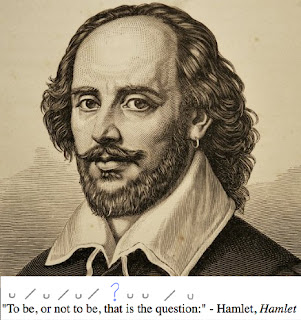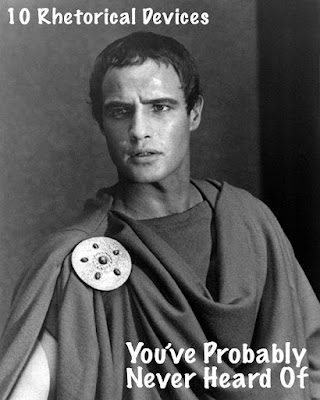In Poetics, Aristotle defined the ideal tragedy and the ideal tragic hero. He argued that the purpose of tragedy was to excite both "pity and fear" in the audience, and, in reaction to the tragedy by feeling those emotions, the audience would experience "purgation" and become more moral beings. To fulfill the purpose of tragedy, Aristotle argued, the ideal tragedy must concern a tragic hero falling from prosperity. This tragic hero must be morally ambiguous: neither totally good, nor totally bad. One fatal flaw must cause the ideal tragic hero's downfall. The audience members pity the ideal tragic hero, because he has some virtues. The audience members relate to the ideal tragic hero and what happens to him throughout the course of the tragedy, enough to fear that what happened to the tragic hero could just as easily happen to them. Aristotle used the example of Sophocles' "Oedipus Rex" as the ideal tragedy, its title character as the ideal tragic hero.
So do Shakespeare's most famous tragedies and tragic heroes fulfill Aristotle's definition of the ideal tragedy?
Most Shakespearean plays do not subscribe to Aristotle's ideal unities of time and place (an outline that the action should be compressed into one day, in one place). Though, a notable exception to that would be Shakespeare's romance The Tempest. Also, Shakespeare wove multiple storylines into one, rather than sticking to only one story in which all of the characters always take part, like Aristotle. For the next descriptions, we will consider the character of the tragic hero.
Othello
Othello is an example of an ideal Aristotelian ideal tragedy. The tragic hero, Othello, has virtues but one fatal flaw: jealousy, the "green-eyed monster." (III.3.170) When the play begins, Othello is already experiencing prosperity. Othello's fatal flaw leads to his downfall: from being a happily married general to killing himself after having murdered his loving wife on false suspicions. Othello helps the audience reach the catharsis of pity and fear which Aristotle believed was the purpose of tragedy. The audience pities Othello for having been manipulated into killing his innocent wife (pity), and the audience realizes their own vulnerability to being manipulated by someone with evil intentions (fear).
Macbeth
Shakespeare's Macbeth adequately fulfills Aristotle's definition of the ideal tragedy. It centers on Macbeth, the tragic hero, rising to the prosperity of kingship, and then falling from that prosperity. His fatal flaw is his own "vaulting ambition," (I.7.27) which contributes to both his rise and his downfall. Ambition "spur[]s" (I.7.25) him to kill King Duncan and secure the kingship for himself in the first act of the play. By the fifth act, however, Macbeth's ambition has turned him into a tyrant. However, Macbeth does not inherently fill the purpose of tragedy, as professed by Aristotle. As the play progresses, the audience may stop pitying Macbeth because of his tyranny, but the audience could still fear that they will find themselves a similar situation.
Hamlet
Hamlet has less of an ideal tragic hero, as defined by Aristotle, than Othello and Macbeth. Hamlet is not an ideal tragic hero because he has no one, clear fatal flaw that leads to his downfall. However, he does begin at prosperity (as the Prince of Denmark) and falls from that prosperity (eventually dying in a duel). At the ending, the audience may be overwhelmed for pity because of Hamlet's lack of a fatal flaw, but may not experience the same fear that they would act the same way in a similar situation because it is difficult for an audience to pinpoint, and see within themselves, Hamlet's defining flaw.




Comments
Post a Comment
All comments are moderated by the Green-Eyed Blogger to avoid spam. If you do not see your comment right away, do not worry; it is simply undergoing our routine moderation process.